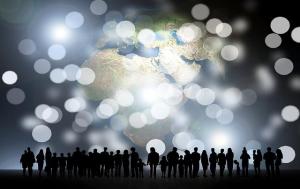 What do anthropologists do about the population explosion? What are the current statistics indicating? This article will examine the current growth in population, the anticipated continued explosion and how such growth has affected humans since the Industrial Revolution.
What do anthropologists do about the population explosion? What are the current statistics indicating? This article will examine the current growth in population, the anticipated continued explosion and how such growth has affected humans since the Industrial Revolution.
Since 2011, there have been approximately seven billion humans on our planet. By 2050, anthropologists and scientists believe this figure will have escalated to 10 billion. While on one hand this is really good news – because it means that people are living longer due to improved healthcare and farming practices – on the other hand, it leads to an escalation in greenhouse gas emissions and fewer resources. In terms of the latter issue, many argue that it is not the population explosion that is to blame for this, but rather a huge rise in consumption. In other words, there is too much global inequality.
To address these problems, Dr. Tim Jones who wrote Future Agenda, believes that our biggest challenge is to develop cities that will address what rapid growth means. He explained this as follows:
“Hong Kong and Paris are good examples where densities are key to success. They are seen as successful cities. For example, just 5% of Hong Kong’s personal income is spent on transportation whereas in Houston it is 20% because everyone drives such huge distances commuting. Paris, with its six- and seven-storey housing, open spaces and street-based cafe culture is a model to aspire to. The Japanese are also role models when it comes to living densities. We must aspire to be like them. For example, we can’t let China shoot past Japan and attempt to live like the Americans.”
But is this a new phenomenon? Since the population explosion started around 2,000 years ago, Oxford College Associate Anthropology Professor Aaron Stutz has established archaeological and demographic data to indicate when humans thrived.
“The Industrial Revolution and public health improvements were proximate reasons that more people lived longer. If you dig further in the past, however, the data suggest that a critical threshold of political and economic organisation set the stage 1,500 to 2,000 years ago, around the start of the Common Era. ‘The resulting political-economic balance was the tipping point for economies of scale – It created a range of opportunities enabling more people to get resources, form successful families and generate enough capital to transfer to the next generation.”
So what has happened is that:
“Humans have used up the natural resources the world can supply in a year in less than eight months, campaigners warned last month. The world has now reached ‘Earth Overshoot Day,’ the point in the year when humans have exhausted supplies.”
So this theory supports the one above that it is not the population growth per se that is causing potential earth problems, but the human consumption in certain corners of the earth. In fact, human population explosion is good and indicative of enhancements in health care and farming practices, but humans need to be respectful and there needs to be enhanced global equality in this regard.